NATIONAL POLLUTIOn pREVENTION rOUNDTABLE |
2019 MVP2 Awards
The 2019 Most Valuable Pollution Prevention (MVP2) awards presented by the National Pollution Prevention Roundtable (NPPR) celebrate the successes of innovators in the areas of pollution prevention and sustainability.
P2 Champion: Global Foundries (Essex Junction, VT)
Previously winner of NPPR’s P2 Champion award, semiconductor chip manufacturer Global Foundries has continued its efforts to reduce impacts while simultaneously improving efficiency and quality in its operations and product.
Global focused on the process step using the most chemicals in its Vermont facility, a physical polishing process using a reactive solid-liquid slurry to achieve a targeted film thickness.

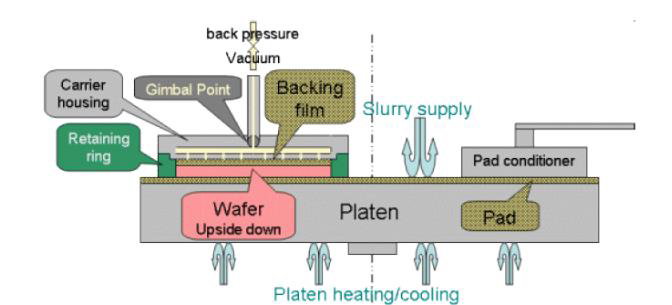
A new tungsten polish process that replaced ferric nitrate with hydrogen peroxide resulted in a 45% faster raw-process time, lowered slurry usage by 10,220 gallons in 2018 (reducing ferric nitrate, alumina, silica, and various inorganic and organic constituents), and saved $96K.
Consolidating thin and thick copper polishing processes enabled use of the same pad for both processes and saved 3,500 gallons of slurry, worth $20K annually. Optimizing the brush clean operation resulted in a 20% throughput gain and 21,000 gallons of water savings in 2018. Global avoided both an additional tool purchase costing $525K and 149,000 KWh of energy and 1,576,800 gallons of water the tool would have consumed annually. Further manufacturing gains included 20% less rework, 45% faster raw-process time, 200 wafers less scrap annually, and over 10,400 hours saved in operator labor.
With an ISO 1400 Environmental Management System, hazardous waste minimization and pollution prevention plans, Lean Manufacturing, TRI chemical reduction targets, “structured problem-solving methodologies”, and collaboration between teams and facilities, Global has once again succeeded in developing new, sustainable processes with significant chemical resource savings, labor reduction, and enhanced manufacturing efficiency, while reducing the overall environmental impact of the chip manufacturing process.
P2 Educator: Lynn Faith Rose (Deerfield, MA)
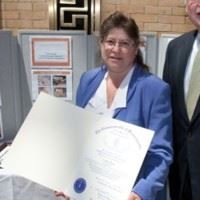
Lynn Rose has more than 25 years of experience as a program director, trainer, and facilitator providing environmental health and safety services to school districts, municipal and state agencies, and small businesses. For the last 9 years, Lynn has assisted in the development of an Environmental Management System for the Worcester Public Schools, sourcing safer products for cleaning and building maintenance, providing training on the best processes for using the safer products, and making sure that the alternative products were listed on the state wide purchasing contract. Recently she has also led a project for the Springfield Department of Parks, Buildings and Recreation Management to pilot 6 organic land care sites throughout the city, including trainings, contract specifications for purchase of organic materials, and a transition plan for 50 school properties and related playing fields and 2400 acres of park land and terraces.
Lynn is well-known in the region for being a leader in convincing institutions to replace toxic chemical products with safer alternatives. She has been a pioneer in training and the on-the-ground in-the-weeds detail work that justifies and ensures the new practices work, and that those who implement them understand what they are doing and why the changes are happening. Lynn’s energy, dedication and tireless research, along with her commitment to vetting whether things actually work, have helped convince large numbers of people to transition to safer products and processes. She has shared information widely and school systems, municipalities and state agencies have benefited from her work. Those who know her comment on her keen intellect and ability to energize others, as well as her team spirit, clarity and generosity.
P2 Students
Ross Goding,
Nicole Kebler, AdorrahLe Khan
The Reusable Bag Project Team of the UMass Lowell School of Public
Health

Around the world concerns are growing about single-use plastic bags, and consumers are encouraged to use reusable bags. But reusable bags can become soiled from continuous use. Those who work in the P2 field know that transitioning from problematic practices is usually not a simple matter, and that it is crucial for those who would be effective change agents to anticipate the problems that might arise from the changes we recommend. For this reason we appreciate that The Reusable Bag Project Team has provided a clear example of thinking ahead, and analyzing how such bags ought to be cleaned so that continued use will not create new problems. Failing to exercise this important anticipatory function can seriously detract from the ability of P2 efforts to convince the public to implement the changes we need.
The team identified different soils on the bags, tested safer alternatives to commercial cleaning materials, and showed how users can extend the life of the reusable bags so that they would not be discarded just because they are dirty. The team was thorough in their approach. They started the project by implementing a survey to determine how people use their reusable grocery bags so that they understood what would be the most common soils. They chose DIY cleaners with safer ingredients to remove the economic barrier to cleaning the bags and to avoid the use of commercial cleaners that might contain harsh chemicals. They tested the cleaners with the most commonly available bag materials. The team conducted public demonstrations and collaborated with Lowell TeleMedia Center to create a video message demonstrating the need for reusable bag washing which airs on the Lowell public access channel. (https://www.youtube.com/watch?time_continue=36&v=3FEAysmC6ss)
P2 Project: Dan Capuano and Ken Stukonis, Lead Teachers (Assabet Valley Regional Technical High School)
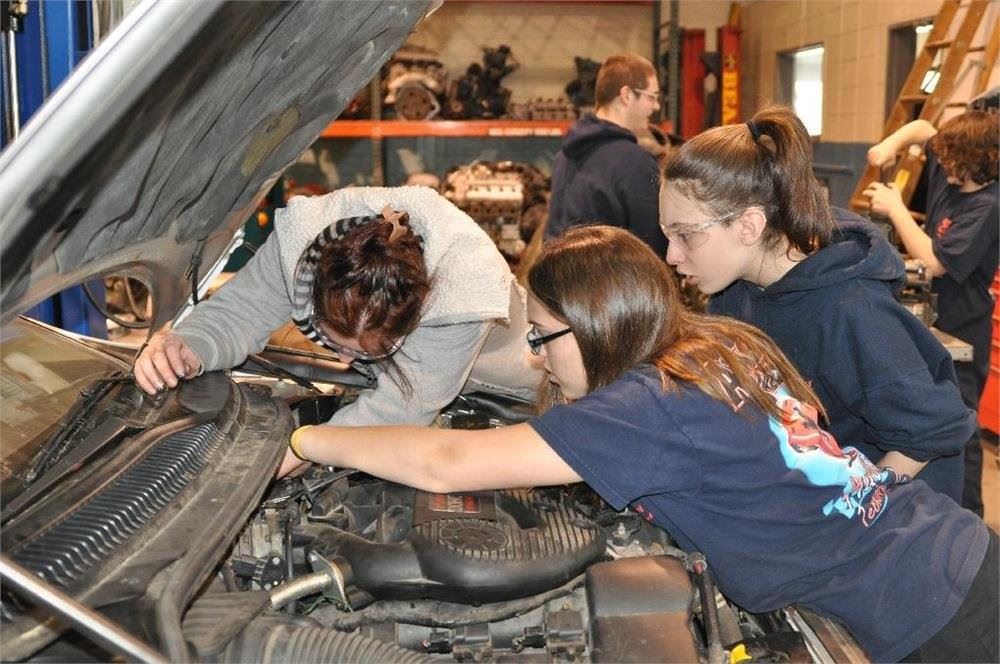
Capuano and Stukonis developed training for the students learning auto body and repair on the use of safer alternatives, and then made a video to communicate to other teachers, students and professionals in the auto body and repair sector the existence of safer alternatives and their health, environmental, and economic benefits. As those who have worked with this sector know, many hazardous organic and inorganic substances threaten the health and welfare of workers, as well as students preparing to enter the field.
The video was shown at a conference of Massachusetts Association of Vocational Administrators, and several attendees requested more information. Every student trained on the safer alternatives at schools that use the information will take the knowledge of safer alternatives into their professional lives. Many professionals in the field work with the Voc-Tech schools, and they and their workers will also benefit.
The video covers the necessary points effectively and efficiently – the risks of the toxic solvents, the efficacy of the safer alternatives, along with their safety, health, and economic benefits; the importance of safeguarding the health of the students and educating them that there are safer alternatives available to them in their careers. https://www.youtube.com/watch?time_continue=142&v=PjQac0Z2WRA
Assisting the auto body and repair sector in transitioning to safer practices has been a priority for state agencies for decades. The contribution by Capuano and Stukonis is a major step forward and will likely be a significant aid to the state in its efforts to protect workers in the field.
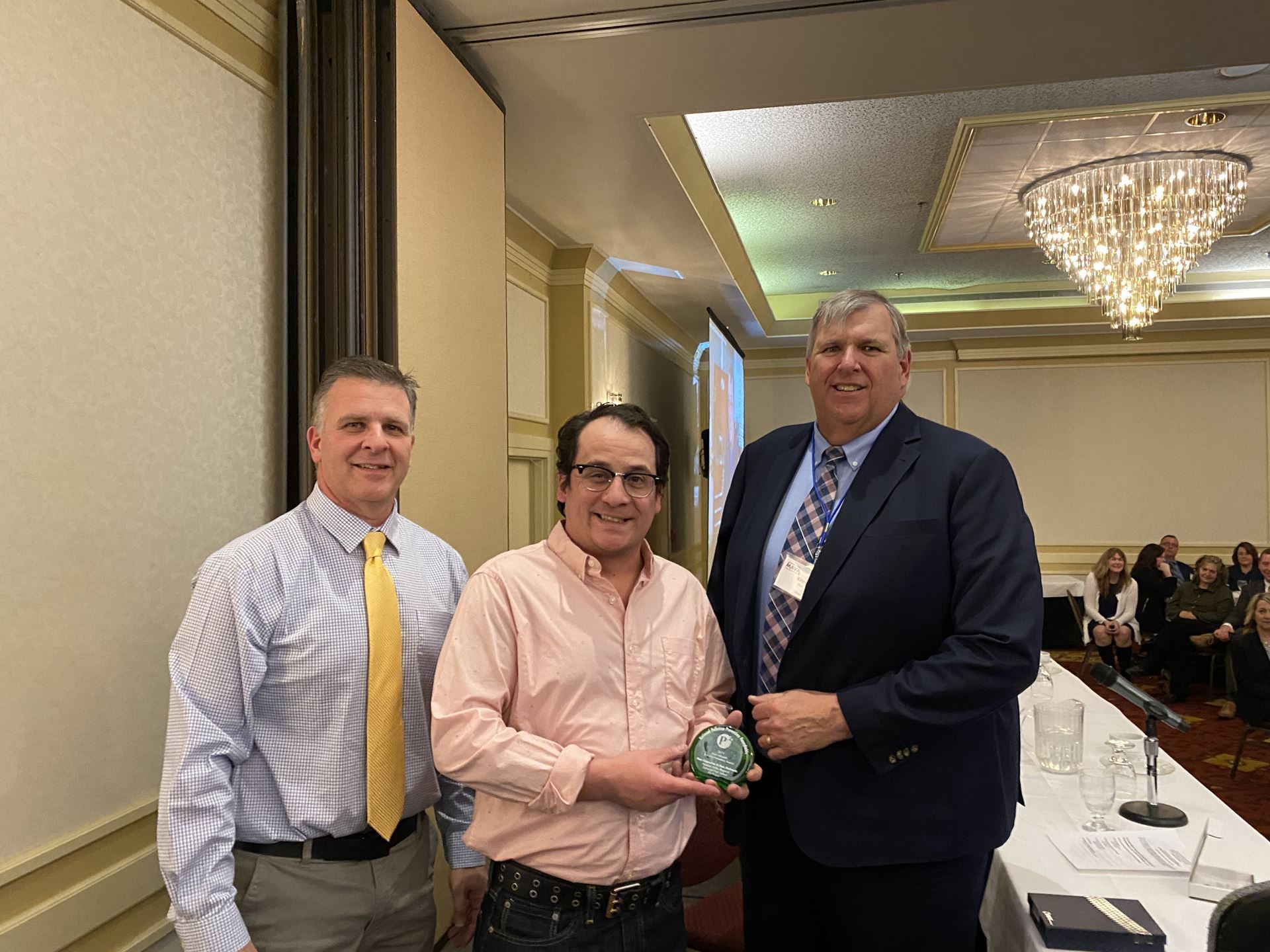
The MVP2 award was presented in February of 2020. Pictured above are (from left to right): Mike Stukonis, Dan Capuano, and Kevin Farr of the Massachusetts Association of Voc-Tech Administrators.
P2 Ambassador: Michael Simpson (City of Los Angeles Sanitation & Environment)
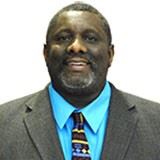
As manager of LA’s Pretreatment program, Simpson ushered in what colleagues termed “a new culture” concerning innovative pollution prevention strategies, for thousands of employees. Described as an “agent of change” by his agency, Simpson created a Project Management Guideline handbook for LA Sanitation with collaborative web based tools and an “L.A. Industry” program, a program that has shifted the regulatory culture to one that now includes collaboration, allowing businesses to thrive.
L.A. Industry is a collaborative partnership effort for not only restoring the Los Angeles manufacturing business base, but also working to develop green manufacturing opportunities for local and regional partners. Simpson’s symposiums, webinars and events have helped demystify regulations, assist businesses with compliance, and incentivize more efficient manufacturing. His Green Chemistry program includes a guide for minimizing or eliminating the generation of toxic chemicals and encouraging the design of safer consumer products. His Materials Exchange Program is under development, to help businesses with materials that have no further use to send them to other businesses where the materials will be of use. Estimates are that around $40 million dollars per year would be saved. He is also working on a Biomimicry Guide. California’s Water Environment Association selected him as the “Pollution Prevention Person of the Year” because of his ability to “think out of the box” and bring professionals together to discuss challenges in the clean water industry.
In addition to the pollution prevention work with businesses listed above, nominators wrote that Michael Simpson’s goals are “always to motivate and educate and develop City staff members and young people to be the best they can possibly be and to pursue their dreams. Having this sort of attitude has two major benefits, it maximizes the efforts of City staff working to make the City a better place, and it promotes a future generation that will focus on environmental challenges and pollution prevention. Michael, along with others, has been actively creating outreach sessions for individuals interested in joining the City as Environmental Compliance Inspectors, Wastewater Operators and Wastewater Collection Workers or other positions in the clean water field. With assistance, Michael has developed and delivered an exam preparation course for Environmental Compliance Inspectors, a growing class in the City of Los Angeles. From his work it is clear that Michael is covering all bases to help further pollution prevention efforts in Los Angeles.”
Multimedia: Marc Espeso, Frank Weber, Lori Forsman, Lauren Rossouw, Denise Cochran (Government Orange County Government, Environmental Protection Division, FLA)

The fundamental aim of pollution prevention is to avoid producing waste. When products such as electronics, bicycles, jewelry, eyeglasses and clothing are repaired instead of discarded, waste generation is avoided. By repairing common household items, we extend their useful lives. Doing this reduces the amount of raw materials needed to produce new items, as well as decreasing the flow of waste to landfills. Orange County Government created a high-end video for social media to easily educate residents about a “Don’t Pitch It, Fix It!” initiative. DPIFI began in the local municipality of Winter Park and was expanded to a collaborative effort with Orange County and the City of Orlando in 2018. To the familiar three R’s of Reduce, Reuse and Recycle Orange County has added another R – Repair.
The video and social media outreach invited residents to repair events, with 41 volunteer fixers sharing their time and talents, reaching tens of thousands of people, and resulting in more than 500 items fixed rather than discarded, with an estimated value of more than $40,000. Residents have been educated about how to complete their own repairs with the necessary ordered parts and how to select better products on future shopping trips. The nominator commented that “A real sense of community is building, where residents and skilled volunteers show their commitment to sustainability by coming together to make a small impact towards the greater cause of less waste for a greener planet. The video is regularly updated and continually inspires residents to Don’t Pitch It, Fix It!” www.ocfl.net/DontPitchItFixIt
P2 Volunteer: Ellie Goldberg (Newton, MA)
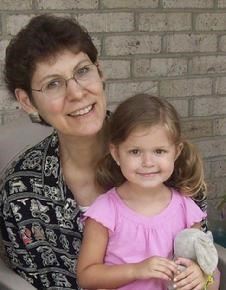
After working as a health educator for the Massachusetts Department of Health in 1989 Ellie founded the healthy kids network, (www.healthy-kids.info), which has provided advocacy for health security, focusing on reducing exposures to toxics and educational equity for students with asthma and other chronic health conditions. Her goal has been to “help educators, health professionals, community officials, organizations, policy makers and parents work together to improve policies and practices so that schools are safe for children's healthy development.”
Ellie has worked assiduously to reduce pesticide use in schools, lead, and other chemicals. She has volunteered her time and expertise to a host of organizations, including Clean Water Action, the Alliance for a Healthy Tomorrow, (a statewide coalition of over 140 public health, education, labor, environmental and community groups working for environmental health and safety), the Committee on Asthma in the School of the National Asthma Education and Prevention Program (NAEPP/National Heart, Lung and Blood Institute/NIH), the Silent Spring Institute, the Massachusetts Healthy Schools Network of the Massachusetts Coalition for Occupational Safety and Health (MassCOSH), Toxics Action Center (MA), the Laboratory Safety Institute, the national Healthy Schools Network, the Asthma and Allergy Foundation of America/New England (AAFA), the Coalition Organized for Health Education in Schools (COHES), the Special Needs Advocacy Network (SPAN), Health Care Without Harm and the Disability Awareness Program in the Newton Public Schools. She has served as legislative chairperson of the Massachusetts PTA, on the Massachusetts Interdisciplinary Health Education and Human Services Advisory Council, in the American Public Health Association (Environmental Section) and the Massachusetts Public Health Association, and as co-chair of GreenCAP, Green Decade Newton’s Committee for Alternatives to Pesticides. GreenCAP's work resulted in the City of Newton's adoption of a comprehensive Integrated Pest Management Policy to eventually eliminate pesticides in all city-owned buildings and grounds. It was the basis of the City of Newton's application for the US Conference of Mayors City Livability Award.
Every year, to mark the anniversary of the 1937 Texas School Explosion, Ellie gives out a Healthy Schools Heroes award to “inspirational leaders who demonstrate an extraordinary sense of responsibility and commitment to the safety of children and their communities.” http://lessonsofthe1937texasschoolexplosion.blogspot.com/p/healthy-schools-heroes-2012-2011-2010_28.html. This year it is Ellie’s turn to receive recognition for her extraordinary career of raising consciousness of the need to detoxify the environments we provide for children.
These organizations and individuals have clearly demonstrated that pollution prevention is beneficial to both the environment and the economy. The MVP2 Awards are awarded in seven categories. If you would like more information, please send us an email at admin@p2.org.
